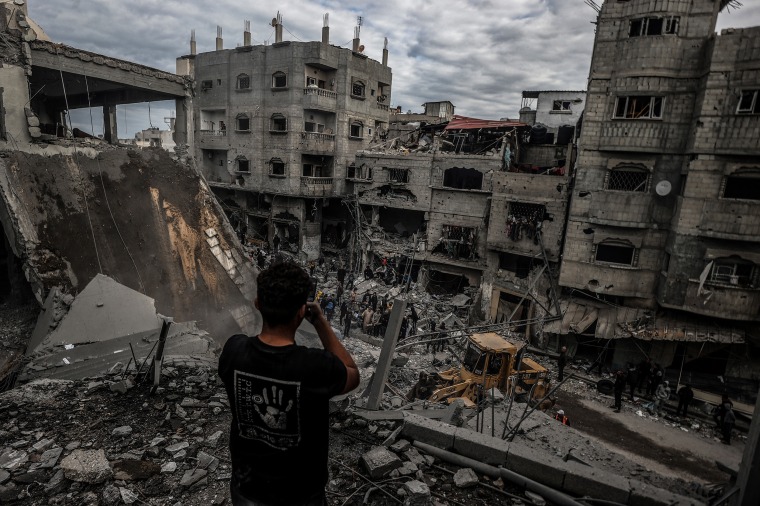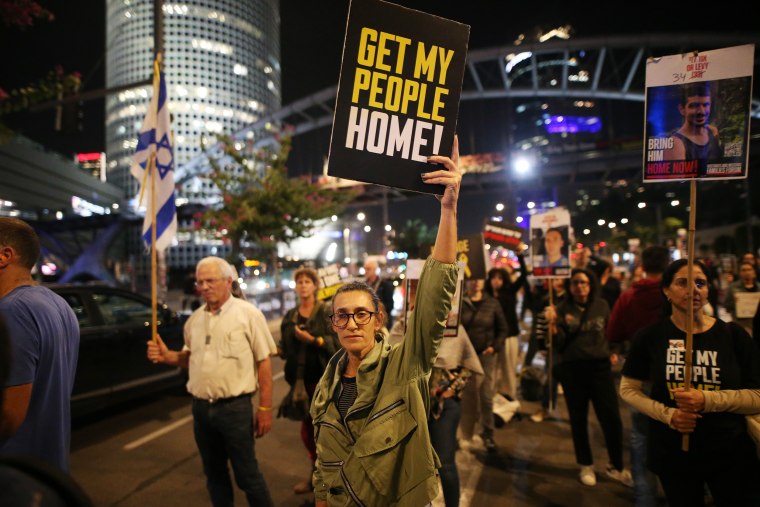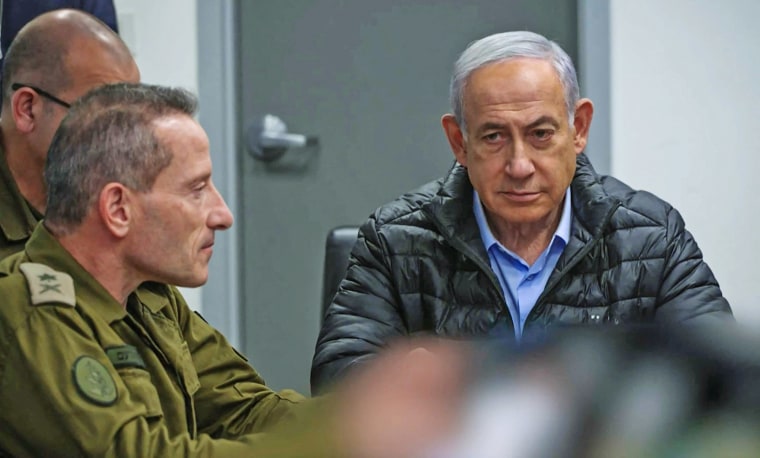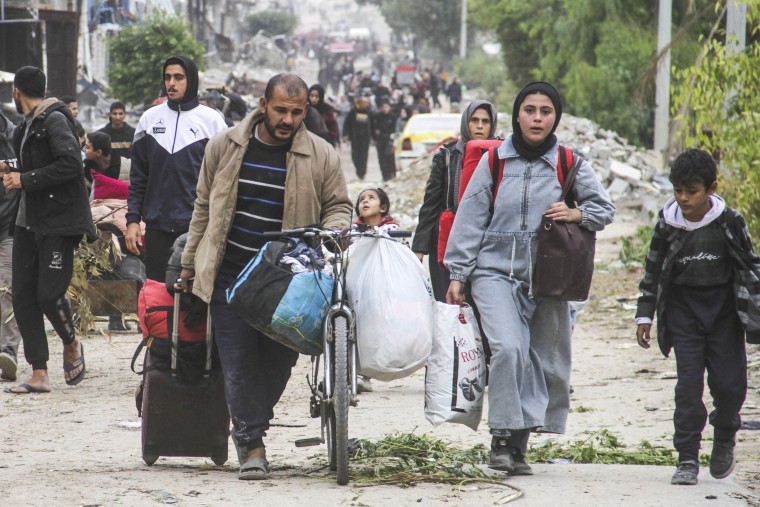Fighting may appear to be winding down between Israel and Lebanon-based Hezbollah, but it remains to be seen how the truce might affect Palestinians desperate for the war in Gaza to end, as well as some of the anguished families of hostages waiting for their loved ones’ return.
On a visit to the Czech Republic on Thursday, Israeli Foreign Minister Gideon Sa’ar said Israel would end the war in Gaza when it “achieves its objectives” of returning the hostages held by Hamas and ensuring the militant group no longer controls the enclave.
“Right now, it is very hard” to see a Palestinian partner for peace, Sa’ar said, before adding that “we believe that eventually peace is inevitable.”
Hamas, meanwhile, has said it is hopeful that any deal with Hezbollah would lead to the end of hostilities in the devastated Palestinian enclave. The group has not indicated that it has shifted from previous negotiating positions of accepting only a permanent ceasefire and the full withdrawal of Israeli forces from Gaza as necessary precursors for releasing any more hostages.
The sense that a pause in fighting at the Lebanese border appears unlikely to spread south in the short term was shared by ordinary residents of Gaza.

In the southern Gaza city of Khan Younis, public relations employee Mohammed Nasser told an NBC News crew that he was trying to resolve his relief about Lebanon with the anxiety of what may still be to come closer to home.
“We had hoped that this agreement would be comprehensive and include the Gaza Strip, or at least a deal would be reached on a ceasefire and end the ongoing suffering here,” said Nasser, 40, who has been displaced from his home in northern Gaza.
“There are great concerns here in the Gaza Strip that the ceasefire in Lebanon will become a reason for expanding military operations here in the Gaza Strip,” he added.
According to local officials, more than 44,000 people have since been killed in Israel’s military campaign in Gaza, which it launched in response to the Oct. 7, 2023, terrorist attack, in which around 1,200 Israelis were killed and around 250 people were taken hostage — dozens of whom are still being held by Hamas and other militant groups.
Israel and its most important ally, the U.S., have come under growing international pressure over the devastating toll the war is taking on civilians in Gaza, with most of the population driven from their homes and hundreds of thousands at risk of famine.
In the meantime, winter is just around the corner for the millions displaced in Gaza, where a severe hunger crisis is underway and access to aid has frequently been lacking.
And fighting is ongoing. On Thursday, Israeli strikes killed at least 17 Palestinians across the Gaza Strip as forces continued their bombardment of central areas and pushed farther north and south in the enclave.
While the agreement with Hezbollah brought “a glimmer of hope, the region remains tense and the humanitarian situation in Gaza unacceptable,” the International Committee of the Red Cross said in a statement Wednesday.
On Thursday, the United Nations Relief and Works Agency for Palestine Refugees in the Near East said in a post on X that out of the 91 attempts the U.N. has made to deliver aid to northern Gaza between Oct. 6 and this week, 82 have been denied and nine have been “impeded.”
International aid organizations have repeatedly said that Israeli authorities are blocking much of the aid destined for Gaza. Israeli officials deny they are blocking aid.
'Deeply disappointed'
Hostage families, meanwhile, have again voiced their dismay that there has been no apparent progress in their quest to have those who were taken on Oct. 7 returned.

“We are deeply disappointed that [the Lebanon ceasefire] doesn’t include a hostage release deal — this was a missed opportunity,” said hostage advocacy group Hostages and Missing Families Forum in a private message to the families of hostages that was obtained by NBC News. “These hostages are suffering under intolerable conditions ... their safe return must be our sole focus.”
Of the 251 people who were taken hostage on Oct. 7, according to Israeli officials, at least 154 have been released, rescued by the Israel Defense Forces, recovered dead or killed in encounters. At least 97 of those kidnapped are still being by Hamas or other militant groups in Gaza. About a third of them are believed to have been killed.
As the conflict in Gaza has dragged on, Israeli Prime Minister Benjamin Netanyahu has faced criticism internationally and domestically for what critics say is his prioritization of keeping together his fractious hard-right and religious coalition government — and his job — over a ceasefire deal.
Some of his fiercest critics have accused him of maintaining a war footing to prevent elections from being held and the possible resumption of criminal proceedings for graft and other allegations against him, all of which he denies.
Eran Etzion, a former deputy head of the Israeli prime minister’s National Security Council who served in the administrations of hawkish Ariel Sharon and centrist Ehud Olmert, said he believed Netanyahu had “no intention of changing the status quo in Gaza.”
“His whole strategy is political and personal,” he told NBC News.
Etzion, who is now a nonresident scholar at the Washington-based Middle East Institute, said the ceasefire with Hezbollah gives the Israeli military a chance to redistribute its resources toward Gaza.
“If the ceasefire holds, it will provide the Israel Defense Forces with time to recuperate, allow the troops to rest, replenish its arms and munitions,” Etzion said.
Andreas Krieg, a senior lecturer at King’s College London’s school of security studies, said Netanyahu could be waiting for President-elect Donald Trump to begin his second term to decide on his next moves in Gaza.

The new administration “will give him more leverage and more leeway to continue fighting the war in Gaza,” Krieg said.
Even if Netanyahu were to agree to a deal with Hamas, it is by no means guaranteed that his government would support it.
Numerous polls have shown the Israeli public as divided but ultimately more supportive of a deal with Hezbollah than they are of one with Hamas. Even then, only 37% of Israelis polled the day before the ceasefire with Hezbollah went into effect said they supported a deal. Some 32% said they opposed such a deal in the survey published by Israel’s Channel 12.
Iran will also be preoccupying Israeli leaders.
Not only does the Hezbollah truce undermine Hamas’ position and isolate Gaza, but it also signals a shift in the attitude of both militias’ Iranian backers, according to Charles Hollis, a former British diplomat to Iran.
“Clearly Hezbollah has had a major setback and Hamas has been pretty much dismantled,” he said “The Iranians aren’t going to have nearly as much ability to resupply their proxies because they’re having to shore up their own domestic defense.”

